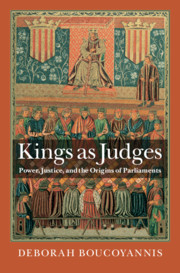Book contents
- Kings as Judges
- Kings as Judges
- Copyright page
- Contents
- Figures
- Tables
- Preface and Acknowledgments
- Part I The Origins of Representative Institutions: Power, Land, and Courts
- Part II The Origins of Representative Practice: Power, Obligation, and Taxation
- 4 Taxation and Representative Practice: Bargaining vs. Compellence
- 5 Variations in Representative Practice: “Absolutist” France and Castile
- 6 No Taxation of Elites, No Representative Institutions
- Part III Trade, Towns, and the Political Economy of Representation
- Part IV Land, Conditionality, and Property Rights
- Part V Why Representation in the West: Petitions, Collective Responsibility, and Supra-Local Organization
- Bibliography
- Index
6 - No Taxation of Elites, No Representative Institutions
from Part II - The Origins of Representative Practice: Power, Obligation, and Taxation
Published online by Cambridge University Press: 18 June 2021
- Kings as Judges
- Kings as Judges
- Copyright page
- Contents
- Figures
- Tables
- Preface and Acknowledgments
- Part I The Origins of Representative Institutions: Power, Land, and Courts
- Part II The Origins of Representative Practice: Power, Obligation, and Taxation
- 4 Taxation and Representative Practice: Bargaining vs. Compellence
- 5 Variations in Representative Practice: “Absolutist” France and Castile
- 6 No Taxation of Elites, No Representative Institutions
- Part III Trade, Towns, and the Political Economy of Representation
- Part IV Land, Conditionality, and Property Rights
- Part V Why Representation in the West: Petitions, Collective Responsibility, and Supra-Local Organization
- Bibliography
- Index
Summary
This chapter offers some empirical support to a main claim in the book, namely that the capacity of the English state was higher than that of France, by examining the typical indicator of capacity, taxation. It focuses particularly on the fiscal burden of the nobility, to show that it was relatively heavy, especially if debt is also considered. Once compelled to contribute to taxation, the English nobility had greater incentives to participate in the institution where it was negotiated, as well as to accept its extension over the broader population. By contrast, the fate of the French Estates-General moved in tandem with the taxation of the nobility; when noble fiscal privileges were consolidated, the institution declined. The chapter also provides comparative data of both fiscal and military extraction, to support the claim of greater infrastructural capacity of the English crown.
- Type
- Chapter
- Information
- Kings as JudgesPower, Justice, and the Origins of Parliaments, pp. 130 - 150Publisher: Cambridge University PressPrint publication year: 2021

